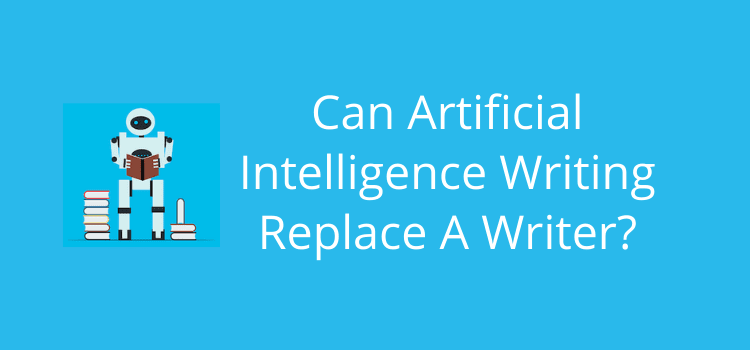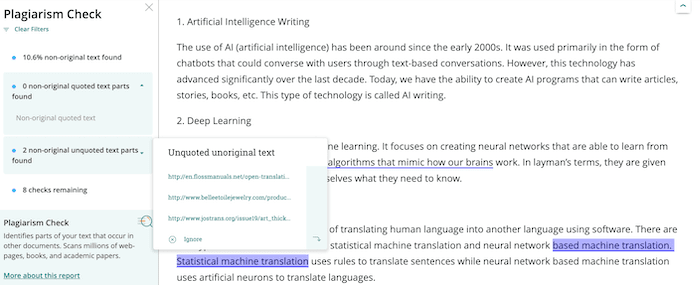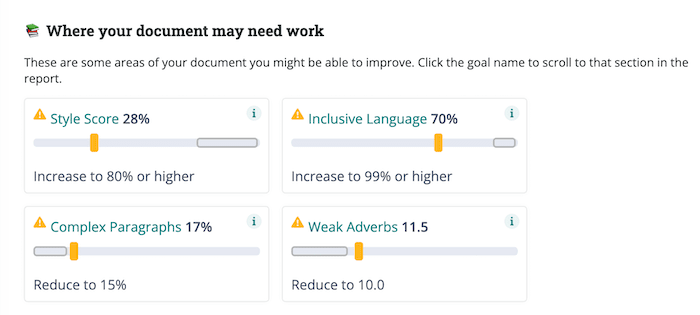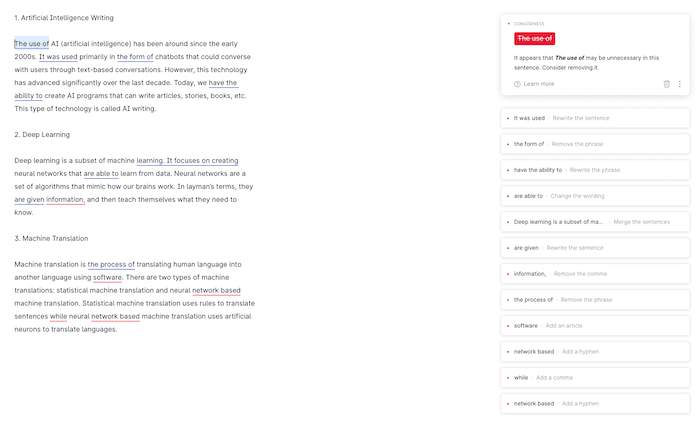
Artificial intelligence writing, more commonly called AI writing, is everywhere on the Internet.
If you are starting a new blog, it is very tempting. It’s so easy to generate blog posts and articles in just a few seconds.
All you need to do is provide a few topic sentences or paragraph headings. Then an AI tool like ChatGPT or Bing Chat Composer will write a full-length article for you.
But how well can an algorithm write, and how do readers react to it?
Artificial intelligence writing and AI tools
AI writing tools and services abound online today.
You can find literally hundreds of both free and paid choices.
But how well can they write?
The simple answer is quite well, surprisingly.
For articles, content marketing, or blog posts, it’s so quick and easy to generate a 1,000-word text.
It’s also possible to use AI to write ebooks and books.
AI writing is not new. The first computer-generated book was published in 1984.
We tend to take AI for granted today. If you use a grammar or writing checker, you are using AI.
Because it is so simple now, it can be tempting to think that you will never need to write again.
But before you rush into generating automated content, you have to consider some of the weaknesses and drawbacks.
Can AI content rank on Google Search?
There is no definitive answer to this question.
It’s a little bit yes, no, or maybe.
However, it’s clear that Google is aware of artificial intelligence writing.
In this article, John Muller, Google’s Search Advocate, says this about AI content writing.
“…if you’re using machine learning tools to generate your content, it’s essentially the same as if you’re just shuffling words around, or looking up synonyms, or doing the translation tricks that people used to do. Those kind of things.
My suspicion is maybe the quality of content is a little bit better than the really old school tools, but for us it’s still automatically generated content, and that means for us it’s still against the Webmaster Guidelines. So we would consider that to be spam.”
But later in the same article, he points out how Google attempts to recognize computer-generated writing.
“And I don’t know how the future will evolve there, but I imagine like with any other of these technologies, there will be a little bit of a cat and mouse game, where sometimes people will do something and they get away with it, and then the webspam team catches up and solves that issue on a broader scale.”
So it would seem that, yes, perhaps automated content can rank.
But only for as long as it takes Google to discover it.
His statement reveals that, as yet, Google doesn’t seem to have automated tools or algorithms to recognize AI content.
So can you kickstart a new blog with AI writing tools and pump out 20, 30, 50, or even more posts?
Yes, you can.
But beware that you could run into indexing and ranking problems with Google and other search engines in the near future.
The quality of AI writing
The best way to illustrate the quality is to give you an example.
Here is a short text that I auto-generated using an online tool. All I did was input the topic, and the tool produced the text in a few seconds.
1. Artificial Intelligence Writing
The use of AI (artificial intelligence) has been around since the early 2000s. It was used primarily in chatbots that could converse with users through text-based conversations. However, this technology has advanced significantly over the last decade. Today, we have the ability to create AI programs that can write articles, stories, books, etc. This type of technology is called AI writing.
2. Deep Learning
Deep learning is a subset of machine learning. It focuses on creating neural networks that are able to learn from data. Neural networks are a set of algorithms that mimic how our brains work. In layman’s terms, they are given information, and then teach themselves what they need to know.
3. Machine Translation
Machine translation is the process of translating human language into another language using software. There are two types of machine translations: statistical machine translation and neural network based machine translation. Statistical machine translation uses rules to translate sentences while neural network based machine translation uses artificial neurons to translate languages.
If you read it quickly, it is a perfectly acceptable text. But let’s look at it in more detail.
Analysis of my AI text
The first thing I did was a plagiarism check.

I was surprised to discover that only a little over 10% of the text was plagiarized content. I had expected a much higher percentage.
So I did a few more checks to verify the result using other plagiarism checkers, and they all returned a similar percentage.
However, when I analyzed the text, some flaws became apparent.

The simple conclusion is that the text is not friendly or easy to read and lacks the human touch.
I also did a grammar check of the text.

The text was 174 words, and there were thirteen critical errors.
You could possibly turn it into a far better text with some editing and rewriting.
But if you want to produce content in a hurry, would you spend all that time improving a text like this?
What about ChatGPT?
It’s free, and it seems as though everyone is using it now.
As a tool to help you find ideas to write about, it’s extremely useful.
All you need to do is ask it to give you a list of five, ten, or twenty key points related to a topic.
Then you have an outline to help you write a new text.
But can ChatGPT write your articles? Yes. But it’s a bad idea.
Like all other AI writing tools, it produces texts lacking personalization.
When I get it to write a text, it reads like an encyclopedia entry.
Another problem is that after you produce a few texts, you notice how similar they are.
There is a lot of passive use and no expression of personal experience.
Yes, ChatGPT is a remarkable new and free tool.
But trusting it to write for you is fraught with issues, especially regarding indexing on search engines.
My feelings about artificial intelligence writing
I’m a writer, and I enjoy writing. It’s what I do.
So, generating a text automatically in a few seconds brings me no joy at all.
I find it cold and programmatic, and it results in zero percent connection with my readers.
You could accuse me of being old-fashioned and failing to accept the reality of technology today.
But the technology is not so new.
I recall reading about a programmer who created 800,000 books and started selling them on Amazon, which was way back in 2012. By chance, I found the original article.
I have to agree with John Muller about AI writing. Automated writing is spam.
It took me about 3-4 hours to write and prepare this article, and I enjoyed every minute because I’m a writer.
There would have been no pleasure for me to create this post in less than 30 seconds.
But for some, well, it might be a different story.
Related reading: You’ll Be A Better Writer When You Learn To Do This One Thing



